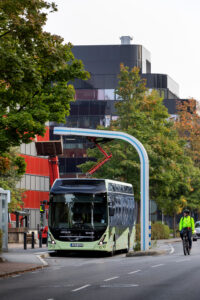The development and implementation of new electrified and sustainable technology will transform the transport systems in our cities. Electrification enables us to decrease the use of fossil fuels and create better urban environments by reducing noise and improving air quality.
Sweden in the forefront
Sweden aims to achieve net-zero emissions of greenhouse gases by 2045. The transport sector is responsible for a significant share of these emissions, and transportation volumes are projected to increase. Therefore, developing and implementing electrified solutions in the transport system is crucial to achieving emission reduction goals.
In Sweden, there is a great focus on developing electric vehicles for both freight and people. Sweden’s vehicle manufacturers are key innovators for new electric and sustainable vehicles. Electric cars, both fully electric or hybrid-electric, have been on the Swedish market for several decades, and the number of these cars on Swedish roads is increasing. In addition to electric cars, electric or hybrid buses and freight trucks are being tested and implemented around Sweden.

Image by Sofia Sabel/imagebank.sweden.se
For example, the collaboration project ElectriCity in Gothenburg promotes the development, testing, and demonstration of new technology and electric solutions in transport, such as the adoption of electric and hybrid buses, leading to reduced climate impact and noise and improved local air quality.
For freight transport, electrification opens up new possibilities, such as night-time delivery with electric and quiet vehicles. Moreover, the implementation of other technological solutions, such as geofencing, can be used to force vehicles to switch to electric drive in certain areas.
The increasing number of electric vehicles calls for the further development of charging infrastructure. Since electric cars have a limited driving range, charging stations must be available, both where the vehicle is parked (e.g., apartment complexes and neighbourhoods) and along roads. Sweden is leading the way in developing and implementing new electric infrastructure.
For instance, Sweden was the first country in the world to launch a pioneering public electric road in 2016. The electric road outside Sandviken and Gävle utilises overhead lines, which powers freight trucks while driving. Another notable example is the eRoadArlanda outside the Arlanda Airport, an innovative project that has been useful in generating knowledge and experiences about electric roads by using a test track. These innovations can allow EVs to travel longer distances without frequent stops for charging, enhancing their practicality.
At the local decision-making level and within the business sector, there is a strong will to implement sustainable solutions. Close collaboration in electrification projects, such as the eRoadArlanda and Elväg E16, can inspire other cities to implement technological innovations that can reduce greenhouse gas emissions, noise pollution and contribute to a resilient and sustainable society.